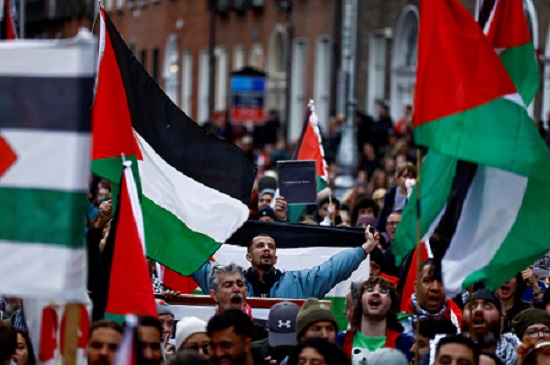Three European Nations To Recognize Palestinian State On May 28
Ireland, Spain, and Norway announced that they would recoginse a Palestinian state on May 28, saying they hoped other Western countries would follow suit, prompting Israel to recall its ambassadors.
Spain’s Prime Minister, Pedro Sanchez said the move was aimed at accelerating efforts to secure a ceasefire in Israel’s war with Hamas in Gaza.
“We hope that our recognition and our reasons contribute to other Western countries following this path, because the more we are, the more strength we will have to impose a ceasefire, to achieve the release of the hostages held by Hamas, to relaunch the political process that can lead to a peace agreement,” he said in a speech to the country’s lower house.
Ireland’s Prime Minister, Simon Harris announced the decision at a news conference in Dublin. He added that Ireland was unequivocal in recognising Israel’s right to exist “securely and in peace with its neighbours”, and calling for all hostages in Gaza to be immediately returned.
In Oslo, Norwegian Prime Minister, Jonas Gahr Store said the only possible political solution between Israelis and Palestinians is “two states living side by side in peace and security”.
Norway said the demarcation of the two states should be based on pre-1967 borders, with Jerusalem as the capital of both, but added that its border recognition should not prejudice negotiations over ultimate border lines.
Ireland also said the borders should be along 1967 lines.
However, Israeli Foreign Minister, Israel Katz ordered the immediate return of the Israeli ambassadors from the three countries for consultations, and warned of further “severe consequences”.
“I am sending a clear message today: Israel will not be complacent against those who undermine its sovereignty and endanger its security,” he said.
Meanwhile, the decision was welcomed by the Palestinian Authority, which exercises limited self-rule in the Israeli-occupied West Bank, and by Hamas, which has ruled the Gaza Strip since driving the PA out of the enclave in 2007.
According to reports, around 144 out of 193 member-states of the United Nations recognise Palestine as a state, including most of the global south, Russia, China, and India. But only a handful of the 27 EU members have done so, mostly former Communist countries as well as Sweden and Cyprus.
Britain, Australia, and EU member Malta have indicated in recent months that they could soon follow suit.
Veto power
Recognition of a Palestinian state is still opposed for now by Israel’s closest ally the United States, which has the power to veto it at the United Nations and did so last month.
Washington says it favours Palestinian statehood eventually, but only as a result of negotiations with Israel, a position it shares with European powers including France and Germany.
Germany said it was a matter that required further dialogue. France said the issue was not a taboo for Paris, but the conditions had not yet been met.
The decision by the three countries marks a further step in Israel’s international isolation, which has grown sharply since its forces began their assault in Gaza in response to the Hamas-led attack on Israel on October 7.
Report says the decision will not produce any immediate changes on the ground in either Gaza or the West Bank but it steps up the pressure for a resumption in long-stalled efforts to reach a political settlement based on an independent Palestinian state existing alongside Israel.
Alon Liel, a former director general of Israel’s foreign ministry and a critic of Netanyahu’s government, told newsmen by phone from Tel Aviv that the move by Spain, Ireland, and Norway could have an important impact on Israeli public opinion.
A joint action, and the equalising of the status of Israel and Palestine in the international sphere, was “a nightmare for the current Israeli leadership”, he said.
Meanwhile, Israeli Prime Minister Benjamin Netanyahu has long rejected such a two-state solution and his resistance has increased since he went into government with a clutch of hard-right religious nationalist parties at the end of 2022.
Israel launched its war in Gaza in retaliation for an October 7 assault by Hamas in which fighters killed 1,200 people and took more than 250 hostages, by Israeli tallies. Israel’s operations in the enclave have killed more than 35,000 Palestinians, according to Gaza’s health ministry.
Israel says recognising Palestinian statehood now would effectively reward Hamas for its attacks.
However, Spain and its allies have spent months lobbying European nations, including France, Portugal, Belgium, and Slovenia, to garner support for the recognition of a Palestinian state.
Yolanda Diaz, Spain’s deputy prime minister and leader of the government’s far-left junior coalition partner Sumar, said she expected the ‘symbolic’ recognition to be an important first step to more concrete action.
“We have to push for the EU to break the agreements and funds it has with Israel, to support investigations into war crimes, to review the arms trade and to press daily for a ceasefire and a stop to the genocide,” she said.
Israel rejects any accusation of genocide in Gaza.
Additionally, Ireland plans to upgrade its representative office in the West Bank to a full embassy and the Palestinian mission in Ireland will also be offered full embassy status, Eamon Ryan, head of one of the Irish government’s three coalition parties said, adding in Ireland this is something that will happen “quite quickly.”
REUTERS/Christopher Ojilere

